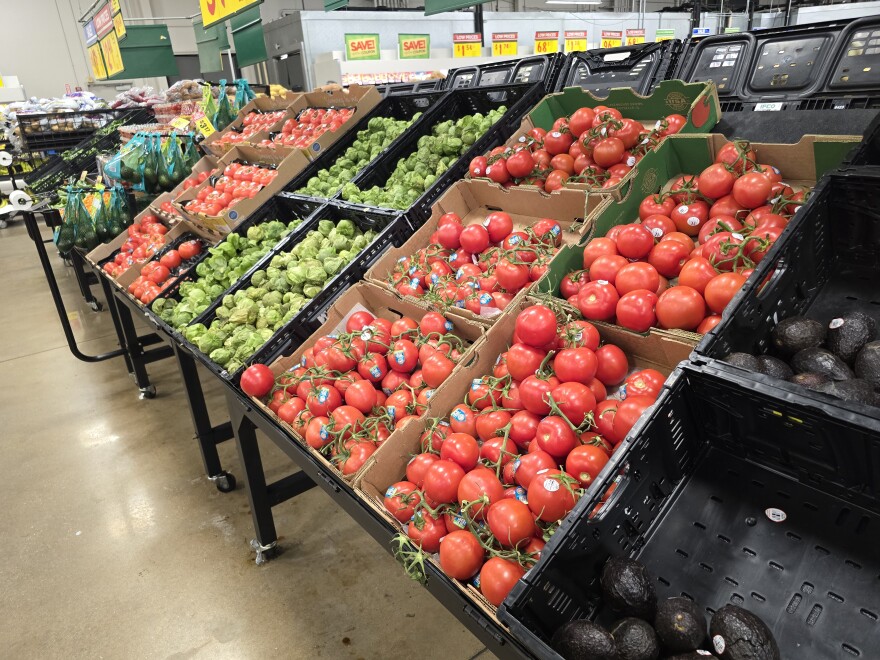Sign up for TPR Today, Texas Public Radio's newsletter that brings our top stories to your inbox each morning.
The U.S. trade war with Mexico continues to stew — and tomatoes—America’s favorite vegetable that's actually a fruit—is caught in the squeeze. Tightening cross-border trade could mean higher prices for consumers.
Mi Tierra Mexican food restaurant in San Antonio’s historic Market Square is an iconic hotspot, popular with locals and tourists alike. When hot plates hit the tables, one ingredient present in every order is the red tomato.
Pete Cortez is the CEO of the La Familia Cortez Restaurants. He jokes and calls himself the “chief enchilada officer.”
“Tomatoes—just about every product that we sell, whether it's ground beef, the taco meat and carne guisada—almost every recipe has tomatoes,” said Cortez. “So huevos rancheros, you don't get the ranchero if you don't get the ranchero sauce for the tomato-base, "he added.
Cortez said last year his restaurants diced about 200,000 pounds of tomatoes. Every one of those tomatoes was grown in Mexico.
“The tomato that we're able to get from Mexico is frankly superior,” said Cortez.
And Cortez is concerned about what an impending tariff on the fruit from Mexico is going to do to his prices.
“There's a cause and there's an effect,” he said. “If the cost of tomato goes up by 25%, then people are going to probably start looking elsewhere.”
On July 14 the United States is set to impose a 21 percent anti-dumping duty on most fresh tomatoes imported from Mexico.
“Dumping” is an unfair trade practice. It means selling below the market value or below production costs. The practice is done to gain market share or undercut domestic producers in the foreign market.

In contrast, even with this inevitable costly consequence, Florida tomato growers say the tariff is necessary.
Robert Gunther, Vice President of the Florida Tomato Exchange, says a duty is different from the Trump tariffs.
“The reason why this is called an anti-dumping duty versus a tariff is because the U.S. government has concluded that the Mexican tomato industry has been dumping tomatoes illegally into the United States, and they've also had material harm to the domestic industry,” said Gunther.
Over 25 years ago, the Department of Commerce ruled that Mexico was illegally undercutting Florida’s tomato growing industry, according to Gunther.
“They broke the law, they broke the U.S. trade law and the government, the U.S. government has sided with that,” he said.
“So none of this makes sense anymore,” said Skip Hulett. He’s the Chief Legal Officer at NatureSweet – a San Antonio-based company specializing in growing, packaging, and selling greenhouse-grown tomatoes. The majority of them grow in Mexico.
Hulett says NatureSweet isn’t dumping Mexican tomatoes – again, that’s selling below production costs. He surmises that they wouldn’t have been able to stay in business. And he points out that the investigation into Mexico’s tomato imports was conducted in 1995 and ‘96.
“Maybe it did in ‘95 and ‘96, but they put up an agreement in place that was in one form or another, has been there for 30 years to protect the U.S. industry,” said Hulett.
But during that time the U.S. tomato industry has been withering. Its share of the U.S. market has dropped from 80 to 30 percent.
“So we've lost farms, we've lost jobs,” said Gunther. “Some of the U.S. experienced dedicated growers in this country have been forced out of business,” said Gunther. And that is all because over the last 30 years, there has been a systematic neglect to abide by U.S. trade laws and sell the tomatoes from Mexico at a fair market price.”
Hulett countered by saying Mexico growers are able to produce a tastier tomato in high volume using state of the art greenhouse technology.
“The members of the Florida Tomato Exchange are open-field where they grow the big tomatoes, gas them red, and consumers have said, we really don't like the taste,” said Hulett. “That's what they're going to provide [at a] higher cost to the consumer.”
Gunther says the 21 percent duty will not result in higher tomato prices. “I would say that consumers are not going to see much of a difference at all,” he said.
But Hulett says NatureSweet will have to raise its prices because of the tariff.
As the Gershwin song lyric goes, “Tomato-Tomahto” —tariff or duty—consumers might say it’s all the same to them. But if all of this means higher prices, they won’t be happy.
Mexico already isn’t happy. They have indicated the possibility of imposing retaliatory tariffs on U.S. meat exports, including chicken and pork, if the tomato duties are enacted.
Disclosure: NatureSweet and La Familia Cortez Restaurants are supporters of Texas Public Radio. We cover them as we would any other business.



